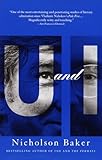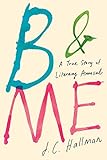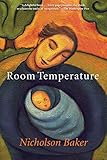
A short time after I finished writing B & Me, a book about Nicholson Baker told in the spirit of Baker’s seminal book-length essay about John Updike, U and I, I was asked to give a reading about Baker’s phone sex novel, Vox, the hitch being that whatever I read aloud needed to be original work, not just something from my book. That was fine with me. Of course it meant that I had to read Vox again, no complaints there, and what I decided to do was read it this time — my fourth time, I think — by listening to it as audiobook, which is the phrase we’ve come to use of late for recordings of authors or actors reading books out loud.

 This made sense for a couple reasons, the first being that I myself would be reading something out loud. That was perfect, because when books were, once upon a time, a much rarer commodity, so rare that not many people owned them, in fact, most people had access to the contents of books only through scheduled public readings, and so going to readings was really what reading was because most people couldn’t afford to sit and read a book in the quiet way that we now think of reading. So reading Vox as an audiobook and reading aloud an essay about doing so was possibly a way of bringing literature full circle and asking what this new audiobook phenomenon, if it’s fair to say there is one, is really about.
This made sense for a couple reasons, the first being that I myself would be reading something out loud. That was perfect, because when books were, once upon a time, a much rarer commodity, so rare that not many people owned them, in fact, most people had access to the contents of books only through scheduled public readings, and so going to readings was really what reading was because most people couldn’t afford to sit and read a book in the quiet way that we now think of reading. So reading Vox as an audiobook and reading aloud an essay about doing so was possibly a way of bringing literature full circle and asking what this new audiobook phenomenon, if it’s fair to say there is one, is really about.
And the second reason this made sense was that Vox, as an all-dialogue, or almost all-dialogue book, would seem to be pretty perfectly suited to the audiobook format, just add another actor for the second voice of the exchange, and I’d already had the thought, while initially reading the book, that Vox would make a pretty good stage play, something on the order of A.R. Gurney’s Love Letters, though of course Vox is much racier and not nearly as mediocre as Love Letters, though it’s snooty of me to say that because I haven’t read Love Letters, or heard it, or seen it. But still.
And so, anyway, not only did I decide to, so to speak, audially re-read Vox, I decided to do this in public, because the audiobook phenomenon, and this may be my hypothesis here, may not actually be helping the world of books because people don’t just sit and audially read books, the way people used to — no, they listen to books while they vacuum, or drive, or exercise, which means that books are more and more coming to play a background role in peoples’ lives, like mood music, and one might reasonably ask whether audiobook reading is really reading at all, in any sense of the word. But that’s not what I would do. And what I did do, audially listen to Vox at a coffee shop over two protracted listening sessions, led to the slightly bizarre but revealing thing that happened because as soon as you introduce technology to the reading equation you introduce, as well, the possibility of “technical difficulties.”
And so what happened was, I didn’t, at the start of my second listening session, jam my headphone plug into my handheld electronic device nearly as far as I needed to for it to engage. Hence, when I turned the book back on, it picked up from where I’d left off the day before, and of course I still had the volume turned quite loud, and of course the coffee shop was crowded with quiet studiers, and, what happened was, the following line, really just a fragment, spoken by veteran stage, film, and audiobook actor Mark Boyett, playing Jim, suddenly burst into the room:
hundreds of female orgasms could be inferred from the books themselves — you didn’t need to harass any particular woman, you didn’t need to invade anybody’s privacy…
Boyett delivered these lines with exactly the kind of hurried, panting enthusiasm that comes from Jim’s words even when you read them just to yourself, and after this short, incomplete phrase, I managed to hit pause. But what was truly remarkable about the moment that followed was that none of the quiet studiers took any note of the voice at all.
This wasn’t the first time I’d experienced something like this. A few years ago, I was teaching in a small conservative college, and, one afternoon, I was seated in a booth in the school’s small, on-campus restaurant, and I was having a quiet lunch, and I was once again surrounded by quiet studiers, mostly students this time. But there were several televisions in the room, all tuned to the same daytime talk show, which no one was watching. I wasn’t watching either, I was grading papers, but my ears piqued when suddenly the panel of talking head hosts began discussing female ejaculation. Now I wouldn’t say that I have any particular interest in female ejaculation. I’m not preoccupied with it, and it’s not something that my mind drifts to all on its own. That said, I’m not averse to the idea of female ejaculation, and so when I heard female ejaculation mentioned quite loudly in an otherwise quiet room I looked up with the sort of expression that probably said something like, “Why, sure, I have a healthy curiosity about female ejaculation, so please, by all means, if you have something new to share on the subject, proceed!” The thing was, I was the only one. I was the only one in a room filled with mostly bored college students. Female ejaculation turned exactly one head in that room — mine.
I thought of this, of course, again, in the coffee shop, when I became, for a moment, an accidental broadcaster of the audiobook rendition of Vox. And once I had fumblingly fixed my headphone plug and settled back into my chair to finish my listening I realized that something actually quite important had been illustrated in that moment. That kind of passive, disinterested silence was about as far as you could get from the reception to Vox’s initial broadcast, its 1992 hardcover publication. This reception went both ways. On the one hand, the book was a giddy, trailblazing bestseller, with a healthy first printing of 50,000 copies and reports that the paperback rights — just the paperback rights — sold for more than a $100,000. But on the other hand, critically speaking, Vox was almost uniformly dismissed as a childish work, triggering a kind of critical anti-orgasm, an involuntary spasm of disgusted adjectives and puritanical claims that this sort of thing was simply beneath a writer of Nicholson Baker’s many talents.

 Praise of his heavily footnoted first novel The Mezzanine aside, this pretty much characterizes Baker’s early career. He fairly often received middling reviews from peers doomed to obscurity, and, oddly, he also found himself subject to bizarre assaults from far more celebrated authors. Indeed, no lesser a light than Stephen King seeped out from the woodwork to cast churlish judgment on Baker’s first two books, The Mezzanine and the even lovelier Room Temperature, which I have to point out are pretty distinct from King’s horror genre — I’m tempted to say they’re not “horrible” in the way King’s books are — and you sort of have to wonder what button of King’s Baker had managed to punch to have solicited the evil eye from the reigning puppetmaster of evil eyes. Similarly, Martin Amis, in an essay reprinted in Visiting Mrs. Nabokov, lashed out at Vox itself with a blasé and mostly unquotable claim that there wasn’t much there there, so there!
Praise of his heavily footnoted first novel The Mezzanine aside, this pretty much characterizes Baker’s early career. He fairly often received middling reviews from peers doomed to obscurity, and, oddly, he also found himself subject to bizarre assaults from far more celebrated authors. Indeed, no lesser a light than Stephen King seeped out from the woodwork to cast churlish judgment on Baker’s first two books, The Mezzanine and the even lovelier Room Temperature, which I have to point out are pretty distinct from King’s horror genre — I’m tempted to say they’re not “horrible” in the way King’s books are — and you sort of have to wonder what button of King’s Baker had managed to punch to have solicited the evil eye from the reigning puppetmaster of evil eyes. Similarly, Martin Amis, in an essay reprinted in Visiting Mrs. Nabokov, lashed out at Vox itself with a blasé and mostly unquotable claim that there wasn’t much there there, so there!
And then there’s Philip Roth. Roth didn’t attack Baker, but he did plagiarize him. Sabbath’s Theatre, published in 1995, includes a long phone sex conversation, a conversation embedded in a very, very Bakerian-style footnote that stretches across 20 pages. Three years after Vox spent a couple months on the bestseller list, and eight years after The Mezzanine reintroduced the footnote to literature, Roth churned out passages like this one, depicting Mickey Sabbath’s fiber-optic seduction of a student:
Oh, I’ll bite on your nipples. Your beautiful pink nipples…Oh, it’s filling up with come now. It’s filling up with hot, thick come. It’s filling up with hot white come. It’s going to shoot out. Want me to come in your mouth?
You might be able to tell where I’m going with this. Because Sabbath’s Theatre was not dismissed as childish or beneath Roth’s many talents. No. It won Roth his second National Book Award and was a finalist for the 1996 Pulitzer Prize. (He lost to Richard Ford’s Independence Day, which, for what it’s worth, also features, briefly, a young female writing student sexually involved with her professor.)
To be fair, New York Times reviewer Michiko Kakutani did lash out at both books. Sabbath’s Theatre, she wrote, was “distasteful and disingenuous,” and Vox was “not particularly revealing or emotionally involving.” But to this I have to say that if a book’s longevity matters at all, if it matters what books people actually keep talking about, or keep reading, or keep audially listening to, then I think it’s fair to say that Kakutani was wrong on both counts. And I’d further say that Vox, though there can be only anecdotal evidence for this, is talked about these days far more often than Sabbath’s Theatre.
But that doesn’t explain why a snippet of the book, or, for that matter, female ejaculation, can fall so flat, these days, when broadcast to the general public. I have a theory about this. What the phenomenon of Vox demonstrates, I think, is a combination of the one old saw about how great books either create a movement or destroy one, and the other old saw about how saints are murdered for the originality of their revelations, and what I want to suggest is that Vox, precisely because it was a good book that left an indelible mark on our world and paved the way for other books that would exceed its celebrity and acclaim — precisely for all this good the book did, for the change it made, it was chided and attacked, and, critically speaking, burned at the stake. The good news is that when you murder a saint you ensure his immortality.
So maybe, now, when we read Vox, we don’t just read the book for its original effects, we read it for its historical value, we read it to remember the world to which it delivered a violent but much-needed chest compression. And perhaps what the exercise of reading an audiobook in public does is recreate that odd life-giving jolt. Because imagine me sitting in my comfy coffee shop chair, nothing in my hands, earbuds in, simply scanning the crowd as Jim and Abby’s voices co-created sexy stories. It would be disingenuous of me not to admit that I sometimes projected those strangers into the book, imagined each of them as Jims and Abbys hovering over their laptops and tablets, occupying Internet chat rooms not really so different from Vox’s telephonic bordello. Truth be told, I drew their attention too, because Vox is a funny book, and I sometimes laughed at it, which means that I was a guy sitting in a chair, appearing to be doing nothing but staring at my fellow coffee drinkers, occasionally giggling. One woman began glancing back at me with a slightly-more-than-worried kind of regularity, and sometime into that second listening session I think I became one of those guys that you sort of need to keep surreptitious track of in public. Indeed, for 20 or more of those coffee regulars I was probably added to an internal database of local potential perverts. But that’s unfair! Because not only does Vox lack the kind of criminal trespass that Mickey Sabbath’s phone sex chat in Sabbath’s Theatre depicts, it’s actually just a simple love story. Michiko Kakutani, I’m sorry, but you missed it. The end of Vox is a quite moving exchange, as, after Jim and Abby’s respective climaxes, they make tentative plans to connect again. It’s a heartfelt goodbye, and it’s very “emotionally involving.” And if it seemed odd to you, my fellow coffee drinkers, that I would sit there for several hours, sometimes laughing, sometimes cringing, and finally getting a little teary — well, what I must insist is that you understand that I was not a pervert. I was not weird, or bored, or crazy. No. I was reading.









